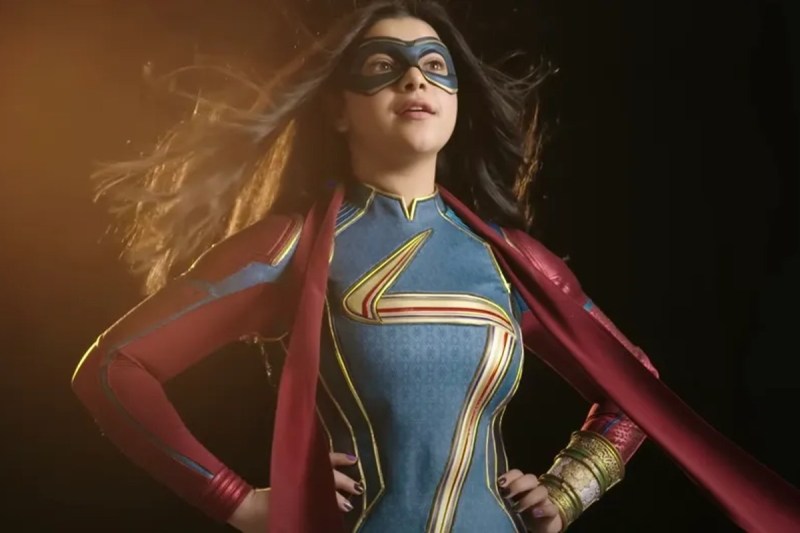The original Ms. Marvel, Carol Danvers, gained superpowers when her DNA forged with Captain America’s in the 1970s. As a Pakistani-American, 2013’s Ms. Marvel, Kamala Khan, represents a very different side of the American experience. As such, her popularity launched her to become the first Muslim American to headline a Marvel comic book. And now, Khan’s got her own Disney+ show.
Rated now with a 96% critical rating on the Tomatometer (and 82% audience score), the show is the highest scoring entry to Disney’s MCU Universe, just edging out Loki. After two episodes, does Ms. Marvel live up to its hype? Let’s dig in to find out.
In 2013, the 10-year-old comic hero burst onto the scene. After appearing first in Captain Marvel comics, Ms. Marvel’s popularity earned the superhero her own series. In 2015, Ms. Marvel Volume 1 became a Hugo award-winning graphic novel, and soon after, the lead character of the Marvel Avengers video game.
Though the show features a surreal, charming tone and stunning visuals, the narrative weight to carry still falls on the titular Ms. Marvel. In the first two episodes, the Pakistani-Canadian actress, Iman Vellani, does an admirable job fleshing out the humanity of her character before introducing her superpowers. In so doing, Vellani also nods to Marvel’s base by celebrating comic fandom’s devotion and endless creativity.

Under the name Sloth Baby, the New Jersey teenager created an animated 10-part series about Captain Marvel and the arc of the episodes lie on Kamala’s efforts to attend AvengerCon. As is true in most comics, however, there are some hints about fanaticism’s dark side.
Among Kamala’s YouTube suggestions is a video titled Bitten by a radioactive feminist? — a subtle reference to the many misogynistic and racist rants appearing on YouTube. Instead of easily identifiable racism, Ms. Marvel details the microaggressions that people of color face every day, such as teachers carelessly mispronouncing Kamala’s name. We get to see her domestic pressure as well as her aunties gossip about women who choose not to get married or socialize with people outside their culture.
“We’re the first show that showcases religion, school-life balance,” Vellani told The Guardian. “I went to a very diverse school, and it’s so important to showcase a child of immigrant parents who is proud of their culture, doesn’t neglect it, and doesn’t feel that they need to separate themselves from religion, their family, or their culture to become their own person.”
Still a teenager, Kamala also has to deal with her own prejudices. After throwing shade at the glitzy Zoe (Laurel Marsden), she saves her life when Zoe is clobbered by Thor’s hammer (which was pretty much Kamala’s fault anyway).
We learn that Kamala’s adjusted powers stem from a family heirloom, an extension of her background and heritage. After critical characters are introduced in the post-credits, we’re left a little in the dust, but wanting more.
In the second episode of Ms. Marvel, we get to see an expansion of Kamala’s family and social life. After a training session with Bruno (Matt Lintz) to test out her powers, we find a quiet moment with the women at the Masjid (mosque). Here, her friend Nakia (Yasmeen Fletcher) gets to voice her displeasure at being a second-class citizen to the male Muslims in the Masjid. She doesn’t fully express her angst at societal ills as she does in the comic books. Either Disney+ is pulling punches or waiting to fully develop the character.
After Kamala makes up with her mom and is able to attend Zoe’s party, a new love interest, the dashing Desi-British Kamran (Rish Shah) leaps from heights into the pool. Her admirer, Bruno, is definitely burned.
At this point, the audience has to be asking where the action is, but Ms. Marvel is more complex than that. The show introduces a Muslim family dinner, and after Kamala’s mother and grandmother refuse to reveal the mystery origins of the bangle that unlocked her powers, Ms. Marvel dives into a colorful, vibrant Eid celebration. In the midst of happiness, however, suspect characters finally show their faces.
Agent Cleary (Arian Moayed) and Agent Deever (Alysia Reiner) interrogate Zoe about the person of enhanced ability at AvengerCon. Here we find the first open instance of America’s Islamophobia with agents agreeing to surveil mosques, but to be aware that mosque-goers are already being tailed by the FBI.
Back at the Eid celebration, Ms. Marvel is able to again use of her superpowers to save a boy who slipped from the top of the mosque by making a set of light steps for him to walk down. Here, we’re reminded that somehow, Kamala is able to shape her powers by sheer will.
In this vein, episode 2 is a slow drip, but a good step to filling in a multicolored storyline. As the family continues to exist within a Muslim community in a Christian country, teenage drama amps up the jealously and romanticism, as several personal mysteries are introduced for Ms. Marvel to unravel.



